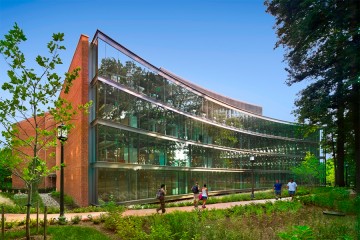The boards of trustees of Johns Hopkins University, Johns Hopkins Medicine, and the Johns Hopkins Health System have voted to adopt the recommendations of the Committee to Establish Principles on Naming, a group charged with developing a set of principles and a process to evaluate requests to rename buildings and programs that recognize individuals whose legacies may now be considered antithetical to the institution's values.
The committee first convened in the summer of 2020 and, after extensive study, consultations, and deliberation, submitted a consensus report containing several recommendations to university and medicine leadership this past spring. The recommendations include the creation of a Name Review Board made up of representatives from across the institution and from the 240,000-member alumni community.
Members of the Hopkins community can submit proposals for consideration to the Johns Hopkins Name Review Board website beginning in early December.
"The boards' votes reflect the seriousness and care with which the Committee to Establish Principles on Naming conducted its work on this important matter during the past year, and recognizes the thoughtfulness of the report," JHU President Ron Daniels, Johns Hopkins Medicine Dean and CEO Paul Rothman, and Johns Hopkins Health System President Kevin Sowers wrote in a message to the university and Johns Hopkins Medicine communities today. "The CEPN has created a process by which we may acknowledge the complexity of reckoning with the legacies of our collective past while embodying the importance of applying guiding criteria consistently and in ways that reflect the core values of our institution."
The committee developed principles and procedures for considering whether to rename a building or program, or to keep a name in place while contextualizing its use without losing sight of the lessons of the past. A summary of the process is available on the committee's website.
The committee's work was informed by consultation with hundreds of members of the Johns Hopkins community, including faculty, staff, students, and alumni, as well as neighbors in Baltimore. Members held 11 virtual listening sessions, posted their work for public comment, and engaged in many hours of discussion.
Daniels, Rothman, and Sowers said they were deeply grateful to the committee members for their dedication, and particularly for the leadership of the committee's co-chairs: Tony Anderson, JHU board of trustees vice chair; Karen Horton, Martin W. Donner Professor and director of the Russell H. Morgan Department of Radiology and Radiological Science; and Lawrence Jackson, Bloomberg Distinguished Professor of English and History.
"We also thank the many members of the Johns Hopkins community who provided their insight and feedback on the committee's work," Daniels, Rothman, and Sowers wrote. "Through this collective effort, we have embodied the best of the academy's belief in rigorous inquiry, open dialogue, and commitment to equity, emerging with a set of first principles and a process that will ground our path forward."
Posted in University News
Tagged university history









